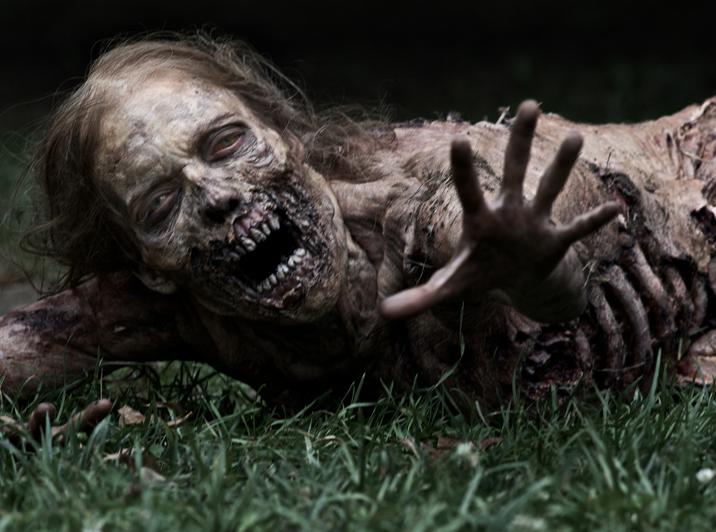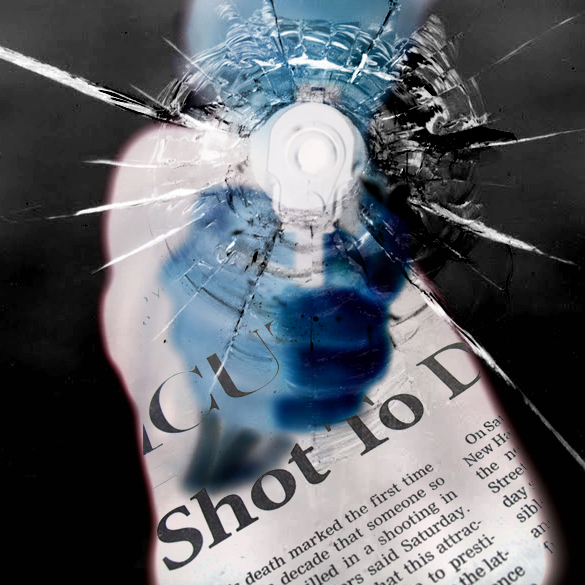By: CARRIE FILIPETTI
I think America is getting soft.
After all, we’re the ones who turned the over-sexed, darkly murderous vampire the likes of Lord Ruthven, Dracula, and Count Orlok into a virginal, sparkling vegetarian with a penchant for whiny pre-pubescent girls. And if that weren’t bad enough, we set him in Washington. State. Not even D.C. Talk about a fall from grace.
So after standing by as a silent witness while Stephanie Meyer murdered the foundation of Western horror by turning it into a brooding archetype for middle school love, I resolved not to allow our culture to continue to kill vampires with anything but garlic; werewolves with anything but silver bullets; and, most importantly, Zombies with anything but blows to the head, usually delivered by angry, shotgun-yielding men defending a beautiful blonde they’ve never met.
Call me a purist. Or someone with good taste. Either works.
It probably surprises no one, then, that when I heard about AMC’s new original series, “The Walking Dead,” my first reaction was a perhaps overzealous “IS THERE NOTHING SACRED IN THIS WORLD?” Granted, Zombie flicks were all pretty much downhill since George Romero’s “Night of the Living Dead,” (1968) which also, poignantly enough, forged the genre. There have been a few noteworthy titles – Romero’s “Dawn of the Dead” (1978) and John Russo’s “Return of the Living Dead” (1985) being the most obvious exceptions— but as a whole the genre has taken a quicker nosedive toward mediocrity than Barack Obama’s first 100 days.
A lot of that has to do with how the genre has been stripped of its classic roots in the name of novelty. I mean, for God’s sakes, Zombies aren’t even dead anymore. I’ll admit – I’m not a Romero classicist, by any means. I enjoyed the rage zombie subtype found in “28 Days Later” (2002)—maybe even more than I enjoyed most traditional undead Zombie flicks. But they aren’t Zombies. Same with “I am Legend” (2007) which was for some unknown reason categorized as a Zombie film despite the clear Vampire undertones of both of the Matheson novel (1954) on which it was based and the film itself. Sure, rage viruses are more likely than the dead reanimating and demanding brains, but the undead are a heck of a lot more creative, and, to be honest, more conducive to social commentary, which was the original purpose of Zombie films.
Despite my skepticism, I’m not one to miss out on a new Zombie opportunity. I mean, I saw the 2008 remake of “Day of the Dead” which was only slightly more enjoyable than finding oneself having to dip one’s hand in a jar of lye to grab a key to escape from a ribcage-busting contraption designed by a murderous freak to be inescapable anyway (“Saw III,” guys. I’m not that sick). Anyway, I couldn’t leave my Zombie expertise incomplete, so I tuned into “The Walking Dead” on Halloween, its premiere.
I have been tuning in – religiously— ever since.
The impeccably directed series (it should be – it is directed by Frank Darabont of “The Shawshank Redemption” and “The Green Mile” fame) is based off of a 2003 award-winning graphic novel by Robert Kirkman and Tony Moore. It follows the trials of Rick Grimes, a police officer from small town Kentucky who ends up comatose in a hospital after a violent shoot-out. Upon waking (cue “28 Days Later” tribute), Ray discovers the hospital –and the town – is abandoned; at least, that is, by the living. The rest of the series follows him as he learns about his post-apocalyptic world, travels to Atlanta to find a survivor colony that, he quickly learns has been infested (truly—there are millions) with Zombies (a cogent reminder that despite what Columbus thinks in “Zombieland,” rule number one in a Zombie apocalypse is always, always, avoid military-sponsored survivor colonies. If they aren’t a lure for other humans to rape and/or kill you, they’re the perfect setting for zombies to do even worse), and joins a band of other survivors in a small outpost just outside the city.

The series is terrifyingly entertaining, with cinema-quality special effects and careful attention to detail. For those who are zombie freaks, the special effects alone, as well as the well-placed shout-outs to zombie movies of the past (the homage to Duane Jones, the actor who played Benjamin in “Night of the Living Dead,” was a particularly noteworthy example, as was the “28 Days Later” introduction and “Dawn of the Dead” mall scene tribute), will be enough to keep us tuned in. The Zombies of “The Walking Dead” are dead, and relatively slow-moving (a potential disappointment for those who prefer rage-zombie subtypes), but as one of the most memorable scenes thus far teaches us, no matter how slow they are, if there are millions of them, you’re S.O.L.
More importantly, though, particularly for those who are not zombie-freaks, the series is a much-needed return to the moral and ethical questions that Zombie movies were intended to address, without becoming overly preachy or self-righteous. What obligation do you have to other humans when humanity is lost? How do we cope with loss and disaster? What are the depths of human depravity?
The series allows us to grapple with these questions while also entertaining us with the more logistical problems that two-and-a-half-hour films simply don’t have the time to address: How do Zombies detect non-Zombies? Can they be tricked? What lures Zombies closer? How do you go about your day-to-day activities during a Zombie apocalypse? How do Zombies affect your relationships with your family and friends? What do you do when your loved one turns into a Zombie? Even Max Brook’s “World War Z” doesn’t get close to answering these prosaic questions the way “The Walking Dead” does.
So whether you’re a “28 Days Later” rage zombie freak or prefer the more classic undead version—or even if you’re interested in the moral questions that were once the basis for the Zombie genre but have been subsequently lost to gore porn and sadism – AMC’s “The Walking Dead” is just what you’ve been looking for. And considering the numbers – “The Walking Dead” brought in 5.5 million viewers for its fifth episode, a 15% increase from the previous week – I’m not the only one who thinks so.

